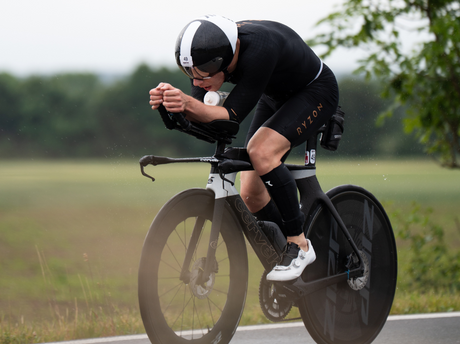Stomach issues are never pleasant. You don't have to be a professional athlete to know that. You feel uncomfortable, all the blood seems to pool in your stomach, and bloating becomes your primary focus. Whatever you consume eventually comes back up, and both the consistency and the volume of getting rid of it seem anything but normal. In short, you feel absolutely miserable. From my experience as a trail runner, I can say that stomach problems while running add a whole new level of discomfort. And it’s even worse when it happens during a race, in front of the camera.
Even after nearly six years as a professional trail runner, I'm still figuring out the right nutrition. It feels like an endless cycle of questions and answers that only gets more complex each year. As more options and choices become available, and with scientific advancements in nutrition making decisions more data-driven, relying on gut instinct is becoming harder. The easy access to scientific information, along with the constant noise from social media, can really make you second-guess your own judgment.

"In my years as a trail runner, I've dealt with the misery of an upset stomach more than once - sometimes, unfortunately, right in front of the camera."
The Commercialization of Food Culture
I believe it’s important that competitive sports remain something emotional. Of course, professionalism involves structure and sticking to essential rules. No matter how much talent you’re genetically blessed with, if you don’t hone it, you’ll eventually hit your physical limits and be overtaken by those who worked harder – who invested in the right areas or made the necessary sacrifices. But still, sports are about passion, determination, and perseverance – the willingness to push beyond limits. A bit of gut feeling is and always will be important. We are human, not machines, and that’s what makes the difference in the end. In my opinion, science won’t be able to explain or replace everything.
This is why I find it so stressful that food, a fundamentally human need, is becoming more and more fact-based. Especially in sports, but also in society as a whole.
A recently published article in the Süddeutsche Zeitung discusses a similar topic. “Food is becoming more and more of a fetish,” it says. One phrase in particular stuck with me: “Efficient eating.” I know this all too well and could sing a song about it. The feeling of overthinking everything about food intake. It’s no longer about nourishing yourself – it’s purely a means to an end, a necessary evil. It’s about a meticulously organized regimen.

“Until recently, I was absolutely convinced that I was eating healthy. But now I realize that my eating habits are actually quite unhealthy.”
Too Much Perfectionism Leads to Bloating
This June, I had an “Aha!” moment. It just clicked, and I can’t even express how grateful I am for that experience. I’ve known for a long time that certain aspects of my eating habits aren’t good. I shop healthy, I avoid sugary drinks, and I don’t touch fast food. If you looked in my pantry, you wouldn’t find anything to criticize. But that’s not the point. It’s more about how I eat rather than what I eat. I spend too much time thinking about food, and yet I don’t give it the importance it deserves. As an athlete, that’s doubly bad because the food I consume is my fuel and the long-term guarantee that my body will function, stay healthy, and keep me performing at my best.
The same old story, I know. But this point is part of the bigger picture, and here’s where I try to connect it back to my “Aha!” moment. I know that eating freely is comparatively difficult for me, and for too long – especially considering my weekly training volume – I didn’t eat enough. This led to evening hunger pangs, constant bloating, discomfort, snacking during the day, no breaks between meals, and an uncontrollable appetite late at night. My digestive system was subjected to what I’d call an unfortunate rhythm. Then there’s the running, which involves a lot of impact that shakes up everything in the stomach. When all of this comes together in a race, where you’re consuming gels and sugary stuff to get enough energy, the stomach eventually says, “I can’t do this anymore.” And rightfully so.
“I spend too much time thinking about food, and yet I don’t give it the importance it deserves.”
That’s where I was at during ZUT. Just like at the Transvulcania Marathon a month earlier, I had terrible stomach issues and had to dive into the bushes multiple times during the race. Everything came out, one way or another. We’ve already established how unpleasant that is. It’s also incredibly frustrating. No matter how well your training has gone, if your body revolts, it’s nearly impossible to achieve your goals. I don’t know what the root cause was in the end, I don’t know where that “Aha!” moment came from, or why I’m now able to maintain a consistent eating routine and incorporate my otherwise healthy lifestyle into my eating habits. Since Garmisch, with a few tiny changes, I’ve finally been able to calm my stomach and gut. The energy released as a result is incredible, and the sense of satisfaction even more so.
That I was able to run possibly my best race in mid-July is, of course, the cherry on top. Because – surprise, surprise – even though I may still not know exactly what my perfect race nutrition looks like, everything worked at Eiger51. Why? A lot of things probably came together. But above all, my body was finally free of bloating and full of the energy needed to perform. And all this without any scientific mumbo jumbo. In the end, all it took were some trusted advice and my gut feeling telling me that things couldn’t go on like this.









